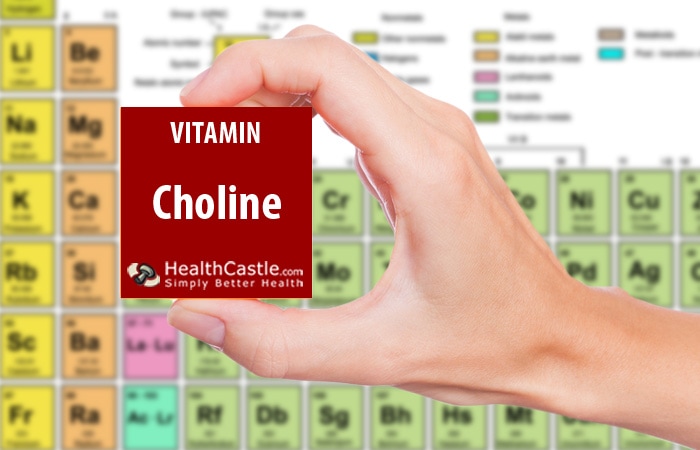
Written By: Carolyn Berry, RD
Title: Registered Dietitian
Alumni: University of British Columbia
Last Updated on:


Choline is an essential nutrient. The majority of the body’s choline is found in specialized fat molecules known as phospholipids, the most common of which is called phosphatidylcholine or lecithin.
The Dietary Reference Intakes (DRI) for choline are shown below:
| Age Group | Recommended Dietary Allowance (RDA) per Day | Tolerable Upper Intake Level (UL) per Day |
| Adults | ||
| 19 years and up | 550 mg men 425 mg women | 3.5 g |
| Kids and Youth | ||
| 1 to 3 years | 200 mg | 1 g |
| 4 to 8 years | 250 mg | 1 g |
| 9 to 13 years | 375 mg | 2 g |
| 14 to 18 years | 550 mg boys 400 mg girls | 3 g |
| Special Considerations | ||
| Pregnant women 14 to 18 years | 450 mg | 3 g |
| Pregnant women 19 years and up | 450 mg | 3.5 g |
| Lactating women 14 to 18 years | 550 mg | 3 g |
| Lactating women 19 years and up | 550 mg | 3.5 g |
Because choline is water soluble, excessive intake of choline-containing foods has not been shown to be toxic to humans.
Choline plays a critical role in the structural integrity of cell membranes. It is necessary for the synthesis of phospholipids and other fat-containing structures in cell membranes. Choline also plays an important role in the transport and metabolism of fats. Choline is a component of a type of phospholipid called phosphatidylcholine, which is a necessary component of the fat particles that transport fat and cholesterol. Without adequate phosphatidylcholine, fat and cholesterol accumulate in the liver.
Choline is a major source of methyl groups. Chemically, choline comprises three methyl groups, making its role in methyl group metabolism highly important. Many crucial chemical events in the body rely on the transfer of methyl groups from one place to another. For example, studies have shown that choline may lessen chronic inflammation in the body through the process of methylation. Choline and its metabolite betaine work together to remove homocysteine and turn off the promoter regions of genes involved in inflammation. Chronic inflammation has been linked to a wide range of conditions including heart disease, osteoporosis, cognitive decline and Alzheimer’s, and type 2 diabetes.
Choline plays an important role in supporting nervous system activity. Choline is a key component of acetylcholine, a neurotransmitter in the nervous system that carries messages to and from nerves. Because of its role in nerve-muscle function, choline supplements have been used experimentally to help improve neuromuscular function in Alzheimer’s disease patients.
Choline deficiency is uncommon; however, there are some factors that can contribute to choline deficiency, including very poor intake, liver problems such as cirrhosis, total parenteral nutrition (TPN), gastric bypass surgery, and kidney transplant.
Choline is widespread in foods, especially milk, liver, eggs, and peanuts.
| Food | Choline per serving |
| Liver (beef), cooked, 3 oz | 383.4 mg |
| Liver (chicken), cooked, 3 oz | 261 mg |
| Egg, hard-boiled, 1 large | 146.9 mg |
| Egg, yolk, raw, 1 large | 139.4 mg |
| Wheat germ, 1/4 cup | 50.5 mg |
| Cauliflower, raw, chopped, 1 cup | 47.1 mg |
| Milk, 2%, 1 cup | 40 mg |
| Pork, various cuts, 3 oz | 39.1 mg |
| Collard greens, boiled, 1/2 cup | 36.5 mg |
| Swiss chard, boiled, 1/2 cup | 25.1 mg |
| Peanuts, shelled, raw, 1/4 cup | 19.2 mg |
In the United States and Canada, the daily value for choline is 550 mg. The % daily value gives you an idea of how much Vitamin B6 is in the food you eat. Choline is not required to be listed on the Nutrition Facts Table, therefore it is often not listed.
Alumni: University of British Columbia – Carolyn Berry is a Vancouver-based Registered Dietitian, self-proclaimed foodie, marathon runner, and owner of Berry Nourished. Carolyn works in a variety of areas including clinical nutrition, outpatient counselling at Medisys Preventive Health Clinic, as a nutrition tour leader with Save-On-Foods, and in the media, including segments on CBC Television, CKNW and Spice Radio. Through informative and practical nutrition advice and her food-first approach to health, Carolyn fulfills her passion to empower others with knowledge about nutrition so that they can make the best decisions to improve their health. She strongly believes that food should be both healthful and delicious.
choline, phosphatidylcholine, vitamins